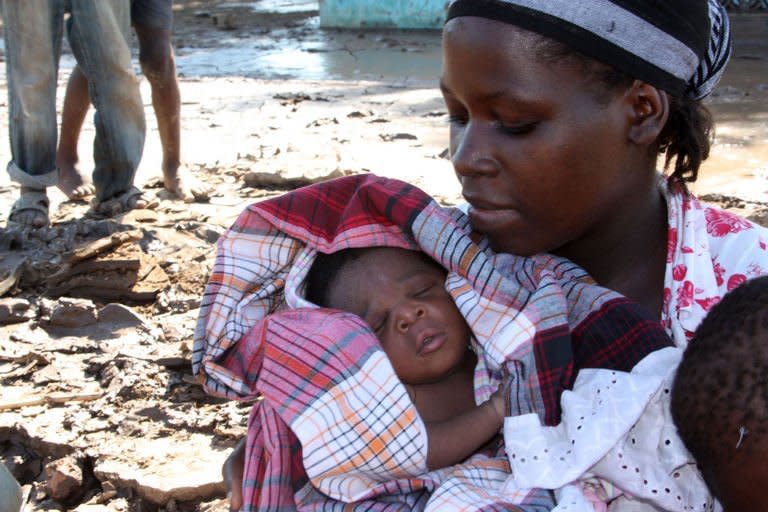150,000 displaced as Mozambique floods spread
Intense flooding in Mozambique has displaced at least 150,000 people, the United Nations said Monday, with the figure expected to rise further as fresh rains spread flooding northward. Heavy rains and overflowing rivers have already killed at least 40 people in the southeastern African country, which is experiencing its worst floods in more than a decade. The south of Mozambique has been most badly hit, with the province of Gaza bearing the brunt of the flood surge. There 150,000 residents have been forced to flee to higher ground, UN spokeswoman Patricia Nakell told AFP. Emergency teams are still reaching isolated areas, adding to the number of victims. "People in high-risk areas are still being rescued," Rita Almeida, a spokeswoman for Mozambique's National Disaster Management Institute, told AFP. Boats, helicopters and trucks have been deployed to scoop up survivors and taken them to safe camps. In the town of Chokwe the scene was one of total devastation. Palm fronds poking through grimy mud-brown water, offer a clue of what this terrain once looked like. Nearby, children and families take refuge on roof tops scattered amid the few belongings they could salvage. At least two women gave birth on rooftops after being marooned by the floodwaters. Many of those stranded have little more than thin cotton sheets to shelter from the elements, which have once again destroyed their town. Chokwe was virtually rebuilt after the devastating floods 13 years ago. With water levels on the Limpopo river touching higher levels than those seen in 2000, when 800 people were killed, no one yet knows what the final human toll will be. Aid agencies and government emergency services have set up scores of temporary camps in the area where flood victims are being fed and housed in tents. But with more heavy rainfall forecast in coming days, they are preparing to fight the crisis on multiple fronts. While water levels on the Limpopo river stabilise, the deluge is expected to swell the Zambezi river basin, spreading the disaster to northern and central Mozambique. "We have more rain predicted for Zambezia province and in the north of Sofala where it is already raining," Almeida said. Sofala province is home to Beira, Mozambique's second city, which lies around 1,000 kilometres (620 miles) along the coast from the capital Maputo. "We are asking people to move out of houses that could be destroyed by rain," Almeida said. Already, 160 millimetres (6 inches) has fallen in Sofala over the past two days. "Over the next five days between 75 and 250 millimetres of rain is predicted," meteorologist Sergio Buque from Mozambique's national weather office said. Humanitarian agencies are already battling to respond to the scale of the crisis. "The main needs are tents and clean water, but they basically need everything," said Katherine Mueller, a spokeswoman for the International Federation of Red Cross and Red Crescent Societies. "There will be a huge need of sanitation, mosquito nets, shelter, kitchen sets and blankets as families begin returning home in the coming weeks." The UN is coordinating relief efforts with non-governmental organisations and the Mozambique government’s disaster management agency. After the deadly floods in 2000, the impoverished country put in place extensive disaster management systems. But the scale of the recent flooding, which has also affected neighbouring Zimbabwe and South Africa, has caught many off-guard. On Friday, UNICEF pegged the total funding needed for humanitarian efforts at $15 million, but anticipated that number would rise dramatically as the situation is better assessed throughout the next few days.



